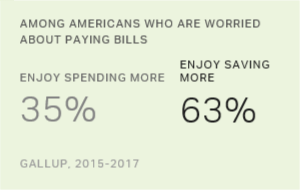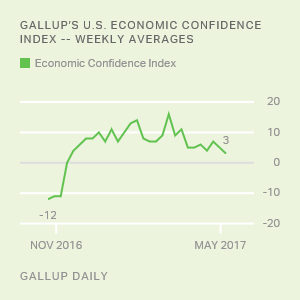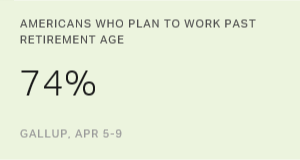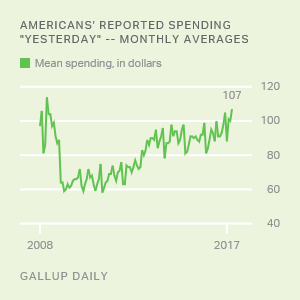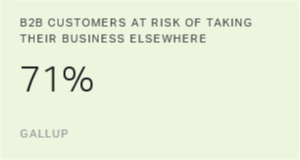Story Highlights
- As the U.S. economy improves, financially stressed still prefer to save
- Pre-recession, financially stressed were split on spending vs. saving
- Other key financial measures have returned to pre-recession levels
WASHINGTON, D.C. -- Before the Great Recession, Americans who were experiencing financial stress were as likely to enjoy spending as they were to enjoy saving, but for the past few years, a solid majority of them have preferred saving.
| 2005-2006 | 2012-2014 | 2015-2017 | ||||||||||||||||||||||||||||||||||||||||||||||||||||||||||||||||||||||||||||||||||||||||||||||||||
|---|---|---|---|---|---|---|---|---|---|---|---|---|---|---|---|---|---|---|---|---|---|---|---|---|---|---|---|---|---|---|---|---|---|---|---|---|---|---|---|---|---|---|---|---|---|---|---|---|---|---|---|---|---|---|---|---|---|---|---|---|---|---|---|---|---|---|---|---|---|---|---|---|---|---|---|---|---|---|---|---|---|---|---|---|---|---|---|---|---|---|---|---|---|---|---|---|---|---|---|---|
| % | % | % | ||||||||||||||||||||||||||||||||||||||||||||||||||||||||||||||||||||||||||||||||||||||||||||||||||
| Worried about paying normal bills | ||||||||||||||||||||||||||||||||||||||||||||||||||||||||||||||||||||||||||||||||||||||||||||||||||||
| Enjoy saving more | 46 | 61 | 63 | |||||||||||||||||||||||||||||||||||||||||||||||||||||||||||||||||||||||||||||||||||||||||||||||||
| Enjoy spending more | 50 | 35 | 35 | |||||||||||||||||||||||||||||||||||||||||||||||||||||||||||||||||||||||||||||||||||||||||||||||||
| Worried about maintaining standard of living | ||||||||||||||||||||||||||||||||||||||||||||||||||||||||||||||||||||||||||||||||||||||||||||||||||||
| Enjoy saving more | 48 | 61 | 64 | |||||||||||||||||||||||||||||||||||||||||||||||||||||||||||||||||||||||||||||||||||||||||||||||||
| Enjoy spending more | 48 | 36 | 35 | |||||||||||||||||||||||||||||||||||||||||||||||||||||||||||||||||||||||||||||||||||||||||||||||||
| Don't have enough money to live comfortably | ||||||||||||||||||||||||||||||||||||||||||||||||||||||||||||||||||||||||||||||||||||||||||||||||||||
| Enjoy saving more | 46 | 65 | 65 | |||||||||||||||||||||||||||||||||||||||||||||||||||||||||||||||||||||||||||||||||||||||||||||||||
| Enjoy spending more | 50 | 32 | 33 | |||||||||||||||||||||||||||||||||||||||||||||||||||||||||||||||||||||||||||||||||||||||||||||||||
| GALLUP | ||||||||||||||||||||||||||||||||||||||||||||||||||||||||||||||||||||||||||||||||||||||||||||||||||||
Whether they worried about being able to pay normal bills, worried about maintaining their standard of living or thought they didn't have enough money to live comfortably, financially stressed Americans in Gallup polls in 2005-2006 were split on whether they enjoyed spending more or saving more. In the wake of the 2007-2009 Great Recession, solid majorities with these views expressed a preference for saving.
Among Americans who did not have those financial worries, a slight majority favored saving in the combined 2005-2006 polls. Among all non-stressed groups across all three types of financial worry, the majorities that preferred saving over spending grew nine percentage points after the recession, compared with the 16- to 19-point increases among the financially stressed groups.
Americans in the financially stressed groups are not necessarily those with the lowest incomes. Over the past three years, a third of those with annual household incomes of $75,000 or more said they worry about maintaining their standard of living, one in six worry about being able to pay their normal monthly bills, and one in 10 say they do not have enough money to live comfortably.
Savings Preference Stays as Other Attitudes Return to Pre-Recession Levels
The steadfastness of the post-recession preference for saving is striking when contrasted with the fluctuations in other measures of Americans' attitudes about the economy and their personal financial situations. Gallup has asked whether Americans enjoy spending or saving more nine times since the recession, and the majorities preferring saving have never dipped below 58%. The three times the question was asked prior to 2007, the percentage who said they enjoyed saving more than spending never surpassed 50%.
Other attitudes, however, shifted significantly in the years right after the recession, only to return to pre-recession levels by 2017 as key economic and personal financial measures returned to or exceeded pre-recession levels.
- Only 30% of Americans said they were worried about paying their normal monthly bills in 2005. That number grew to 44% in 2009, but dropped back to 31% this year.
- Ten percent in 2006 thought it likely they would lose their job in the next year. That number more than doubled in 2010 to 21%. Now it is down to 8%.
- In 2005, 37% thought it was a good time to find a quality job. By 2009, only 10% thought so. Now 50% think it's a good time.
While Americans' recession-born financial fears have abated as the national economy has improved, the increased desire to save has held firm.
Bottom Line
The increase in Americans saying they prefer saving has been somewhat reflected in national savings rates, which have increased modestly from pre-recession levels. Some opine that the higher savings rates are good for the economy, as so many economists insist, or bad, as argued by those who think more spending is the cure for a sluggish economy since spending accounts for such a large part of the nation's gross domestic product.
However, there is little disagreement with the idea that those who are in peril of losing their homes, filing for bankruptcy, being evicted or suffering other forms of financial ruin will benefit, and so will the economy as a whole, if they have discovered the pleasures of being able to save more and spend less.
For that reason, it is generally a welcome sign that the financially stressed continue to prefer saving, even as other attitudes about finances and the economy have moved back to pre-recession levels.
Historical data are available in Gallup Analytics.
Survey Methods
Results for this Gallup poll are based on telephone interviews conducted April 5-9, 2017, with a random sample of 1,019 national adults, aged 18 and older, living in all 50 U.S. states and the District of Columbia. For results based on the sample of national adults, the margin of sampling error is ±4 percentage points at the 95% confidence level. All reported margins of sampling error include computed design effects for weighting.
Each sample of national adults includes a minimum quota of 70% cellphone respondents and 30% landline respondents, with additional minimum quotas by time zone within region. Landline and cellular telephone numbers are selected using random-digit-dial methods.
Learn more about how the Gallup Poll Social Series works.
